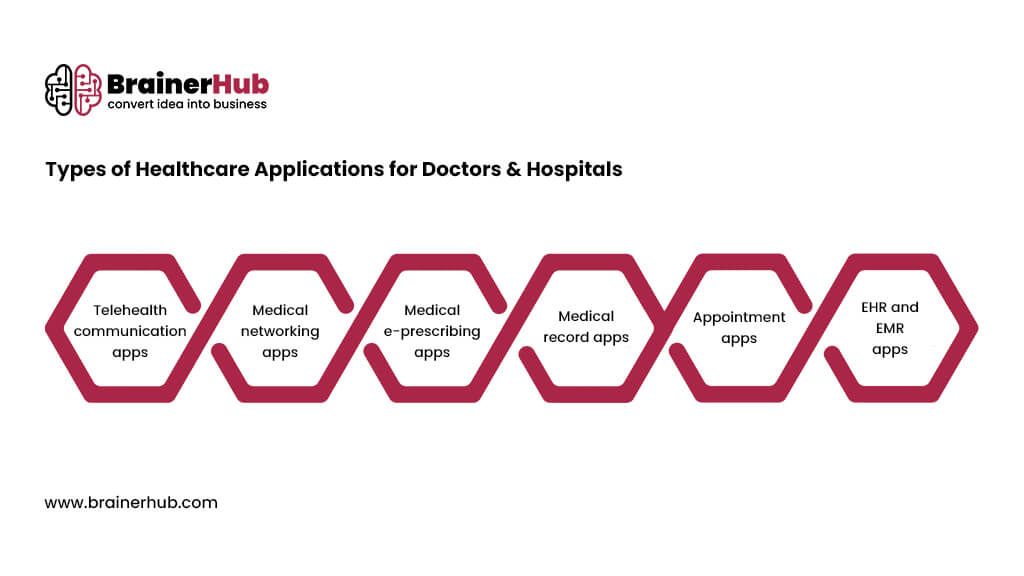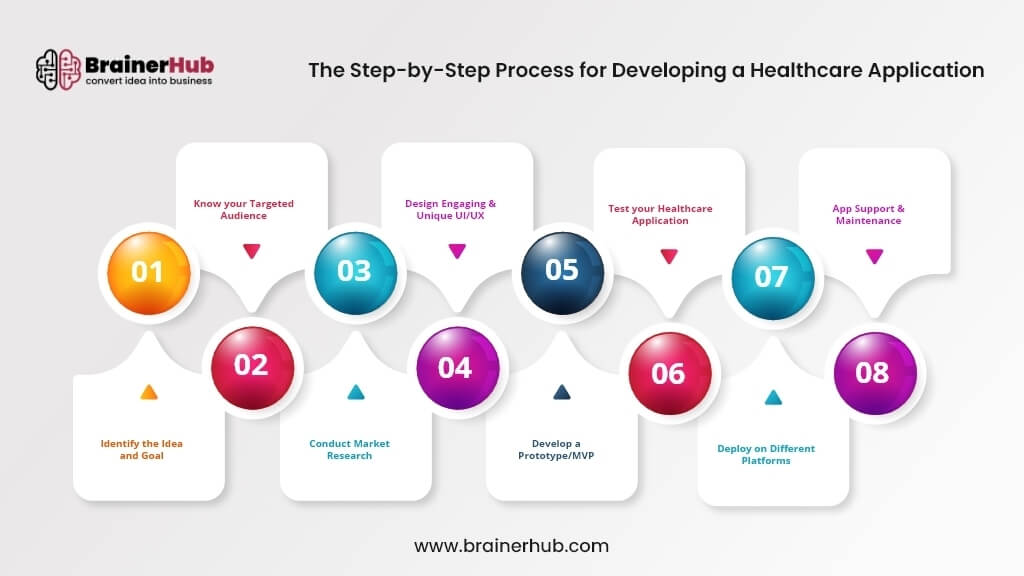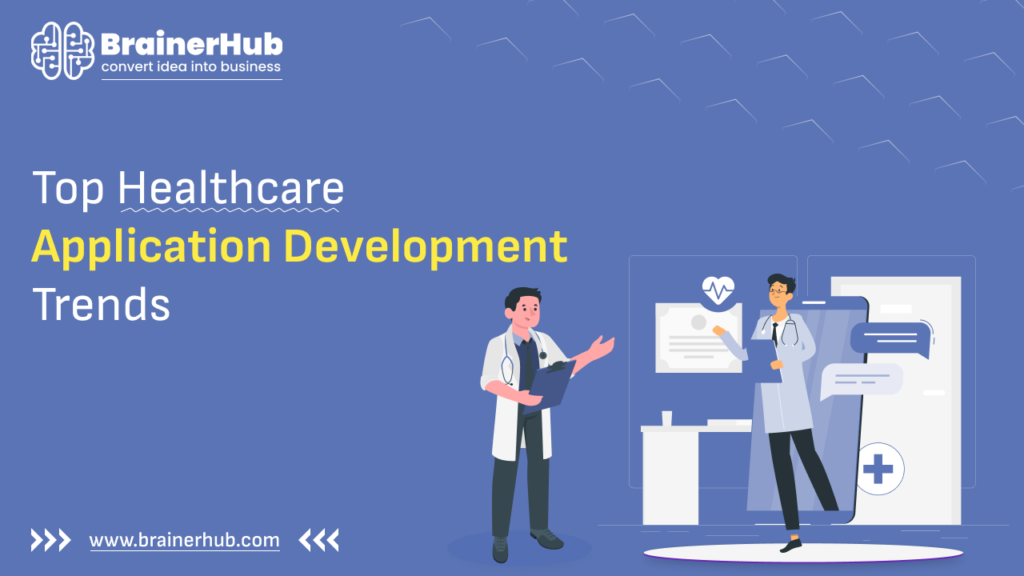The evolution of healthcare applications has witnessed immense growth and achieved remarkable results in a nick of time. With the increase in demand for healthcare facilities, creating tailored solutions that could meet industrial standards has become highly essential. There is no denying, to the fact that developing an application for healthcare services comes with numerous challenges. The main priority is to help both medical professionals and users so they could connect better while simplifying further procedures. Furthermore, it allows users to access their medical information and healthcare features within a few clicks.
What is Healthcare Application Development?
To begin with, healthcare application development is designed to achieve tailored solutions for all health-related problems. Many healthcare businesses have shifted their focus towards mobile application development to attract targeted audience and provide them all general healthcare facilities within few taps. The application provides features like physical activity tracking, yoga and meditation, nutrition, information on nearest medical assistance along with other wellbeing support.
Next, let’s discuss the targeted audience for healthcare application development in detail
- For healthcare professionals/providers
- For general users
1. For healthcare professionals
The application helps with collecting patient’s medical information that will facilitate with early disease detection. Further, it assists with scheduling online video or audio appointments with the doctors. This will help to diagnose the health problems accurately and prescribe medicines. Expert healthcare providers could monitor their patient’s progress and could recommend treatment based on the collected information.
Benefits of Healthcare Application Development for Healthcare Providers:
- Electronic Health Record – The application collects patient medical information and history that gets stored in electronic health records for better evaluation of the case. Eventually, healthcare records will save time and limit the chances of error.
- Accurate Diagnosis – The application conducts accurate diagnosis and provide tailored treatment to improve overall wellbeing.
- E- Prescribing Medicines – Healthcare providers assist with e-prescribing of medicines so one could begin with their treatment almost immediately.
- Clear Communication Channels -The mobile healthcare application provides platform for improved communication that includes conducting comprehensive consultation and discussion regarding patient’s health problems. Patients could always book their appointment according to convenience.
- Less Stress & Anxiety – Clear communication and guidance will automatically lead to less stress and burnout as one could easily connect with their doctors in few clicks.
Types of Healthcare Applications for Doctors & Hospitals
- Telehealth communication apps
- Medical networking apps
- Medical e-prescribing apps
- Medical record apps
- Appointment apps
- EHR and EMR apps

2. For General Users
For general public, healthcare applications provide advance features such as tracking fitness, scheduling consultation, monitoring daily health record, measuring heart health, medical guidance, and at home healthcare delivery services. Furthermore, the application can also prepare nutrition plan according to your food preferences. Overall, individuals could seek complete health assistance within few taps and get quick responses.
Benefits of Healthcare Application Development for General Users:
- Comprehensive Patient Healthcare – The advance mobile healthcare application assists with monitoring, tracking, detection and treatments so users can find all tailored solutions at once.
- Healthcare Features & Facilities – General users can monitor their sleeping patterns, heart rate, daily health record, and detect diseases at early stage with IoT connected portable devices.
- Accessibility to Patient’s Medical History – In general, healthcare application development collects patient’s health information and medical history for better monitoring purposes. The application also suggests health aids for day-to-day life, monitor daily report and provide general aids for better wellbeing.
- Availability of Medical Services – For better healthcare service approach, the application provides the feature of door-to-door delivery for prescribed medicines and also collect samples on request for conducting test.
- Quick & Easy Communication – Healthcare applications provide chatrooms for general users and doctors so they could communicate freely. This platform also provides the opportunity to schedule video or audio consultation at your convenience.
Types of Healthcare Applications for Patients
- Monitoring apps
- Diagnosis apps
- Mental health apps
- Health guidance apps
- Nutrition apps
To summarize, the advance approach of the healthcare application allows patients and medical professionals to connect as well as solve problems while focusing on wellbeing. One could simply get advice, consultation and prescriptions within few taps on their smart phones.
Thinking about developing a healthcare app? Utilize our 8+ years of expertise to create a product that resonates with users.
How Does Healthcare App Development Differ from Medical App Development?
While both healthcare and medical app development aim to improve wellness and support health-related needs, there are distinct differences between the two. These differences lie in their core purposes, target users, regulatory requirements, and data handling. Recognizing these distinctions is essential for anyone planning to develop an mHealth app.
Healthcare App Development
Healthcare app development is focused on creating applications that enhance general health and wellness. These apps cater to a wide audience, from individuals looking to improve their fitness to those wanting lifestyle support. Common examples of healthcare apps include:
- Fitness and Activity Tracking: Apps that monitor daily steps, exercise, and general physical activity.
- Mindfulness and Meditation: Tools that support mental wellness through guided meditation and relaxation exercises.
- Nutrition and Diet Tracking: Applications that help users manage their diet, calorie intake, and overall nutrition.
- Local Health Resources: Apps that help users locate nearby health services, such as pharmacies or clinics.
Medical App Development
Medical app development, on the other hand, is tailored specifically for use by healthcare professionals and patients in a clinical setting. These apps often require strict compliance with healthcare regulations, such as HIPAA in the United States, to ensure patient data security. Examples of medical apps include:
- Telemedicine Platforms: Solutions that enable virtual consultations between doctors and patients.
- Remote Patient Monitoring: Apps that allow healthcare providers to monitor patient health data remotely, often in real-time.
- Electronic Health Records (EHR): Applications for storing, accessing, and managing patient records digitally.
- Chronic Disease Management: Tools that support patients and healthcare providers in managing chronic conditions like diabetes, hypertension, and asthma.

The Step-by-Step Process for Developing a Healthcare Application:
Identify the Idea and Goal
The initial stage of developing healthcare application is understanding user’s needs and identifying the problem. Further, this procedure will help to evaluate the problem and recommend necessary updates that will help to achieve the targeted goal through the application.
Know your Targeted Audience
Businesses in healthcare sector wants to offer best possible services and attract more audience towards them. It is important to know users’ needs and expectations from the application that will help to improve as well as deliver better in the future of healthcare development.
Conduct Market Research
Once you have identified your target audiences’ needs and problems, begin with conducting comprehensive market research that will help you to analyze competitors’ application as well as gaps that you can fill in. This analysis will define your mobile healthcare application’s features and functionalities to fulfill all the necessary criteria. Furthermore, its highly important to grasp knowledge regarding regulatory compliance related to the healthcare sector.
Design Engaging & Unique UI/UX
For any application development UI/UX plays a vital role. As known, UI is the first level of connection with the user. It also depends on whether the application is for medical professionals or general public. If the application is for healthcare professionals, it should have bigger fonts, simple approach and easy to access features.
While for general users, the application requires colorful designs, clear fonts, visual components, attractive background and easy to navigate buttons. It is highly important for the application to be user friendly to attract targeted audience.
Develop a Prototype/MVP
Developing an MVP instead of full-fledged application will help to understand the progress better before jumping into the market. Serving as the cornerstone for the final product, the MVP aids in validating the concept, features and approach. Moreover, crafting a prototype will allow to test concept’s feasibility.
The procedure also involves gathering data and feedback from potential users. This will help to refine app’s features and functionality better before stepping in the market. By presenting your MVP to investors, you can demonstrate market demand for your application and attract potential interest.
Test your Healthcare Application
Once the development process is completed for healthcare application, the next step should be testing. This is the most crucial step for healthcare application as it would showcase overall progress. Further, the application goes through various levels that include unit testing, integration testing, regression testing, assessing security measures and more.
Additionally, beta testing is conducting to evaluate app with real time users for gaining reliable insights from potential audience. The testing method will not only aid in reducing healthcare app development costs and time but also detect bug intervention for improving overall app operations.
Deploy on Different Platforms
After conducting comprehensive testing methods and ensuring no bugs exist in the mobile healthcare application, deploy on different platforms (such as google play store, apple app store and more). For smooth process, follow all necessary rules and regulations to avoid any complication while uploading the healthcare application.
App Support & Maintenance
The healthcare application would need constant support and maintenance once launched in the market. This step involves fixing technical glitches, bugs and errors that may occur during the time of using the application. To attract wider target audience new updates and features should be introduced at timely intervals that will meet latest industrial standards as well as engage them more with advance version of healthcare application.

Best Practices & Top Technologies for Healthcare Application – An Overview
Healthcare apps have become integral part of healthcare sectors. These applications cater to a spectrum of needs, ranging from patient management systems to telemedicine platforms and wearable health devices. At the core of healthcare app development lies a meticulous process that integrates specific compliances such as:
- HIPPA
- CCPA
- GDPR
- HiTech
- FHIR
- OWASP and more
Professional developers amalgamate with advance technologies to ensure seamless functionality, data security and user-friendly interfaces. This includes:
- Artificial Intelligence
- Cloud Computing
- IoMT
- Blockchain
Healthcare applications promote remote consultation, real time monitory of vital signs, e- prescriptions, tailored treatment plans, seeking health guidelines and tracking daily physical activity.
What Is the Cost of Developing a Healthcare App?
The cost to develop a healthcare app typically falls between $40,000 and $80,000, but this range can vary depending on several factors. Key cost drivers include the app’s complexity, choice of platform, design elements, and the level of expertise of the development team.
One of the most significant factors affecting cost is feature complexity. Basic apps with standard features are less costly to develop, while those requiring advanced functionalities—such as telemedicine, real-time messaging, or Electronic Health Record (EHR) integration—will demand a higher budget due to the additional development time and resources needed.
The experience and skills of the development team also impact the overall cost. Hiring a team with expertise in healthcare app development ensures regulatory compliance and high-quality code, which is critical for building a reliable and secure app.
Design is another factor that can influence the budget. A well-designed, intuitive user interface enhances user experience, which is essential for healthcare apps. While investing in quality design may increase upfront costs, it can lead to better user engagement and satisfaction over time.
Before starting development, having an estimated budget for your healthcare app is important. Consulting with a skilled mobile app development company can help you receive a tailored quote and guidance on building a robust, cost-effective mHealth app within your budget constraints.
Conclusion on Healthcare Application Development
Healthcare application development heralds a new era of patient centered care and streamlined medical processes. These apps, powered by cutting edge technologies, bridge the gap between patients and healthcare providers, offering convenience, accessibility, and efficiency. From remote consultations to personalized treatment plans, they revolutionize healthcare delivery while adhering to stringent security and compliance standards. As the healthcare landscape evolves, the role of these applications will only grow, shaping a future where quality healthcare is readily available to all, anytime and anywhere.
Are you interested in developing healthcare application?
Get in touch with our professional team today!
Do you have a project in mind? Talk to the experts.
Get in Touch
We’d love to resolve your queries with personalized assistance.
Contact us
Our Office
D-101/102/501/601 Titanium Square Building, Near Thaltej Cross Road, Sarkhej - Gandhinagar Highway, Ahmedabad, Gujarat 380059
FAQs
Basically, developing a healthcare app will improve communication between patients and medical professionals. The app will improve decision making, enhance efficiency, save time, increase productivity, and provide 24×7 accessibility. Further, the application offers platform for audio and video consultation to conduct accurate diagnosis.
The cost to build a healthcare application will range between $50,000 to $100,000. The application development depends on features, functionalities, platforms, technology stacks, and other important development stacks. It’s important to build an app that will fulfil the gaps of existing model and attract wider targeted audience.
This is the most important aspect to consider while developing a mobile healthcare application. Features such as geolocation, push notification, chat bots, real time communication, social media integration, reviews and feedbacks.




